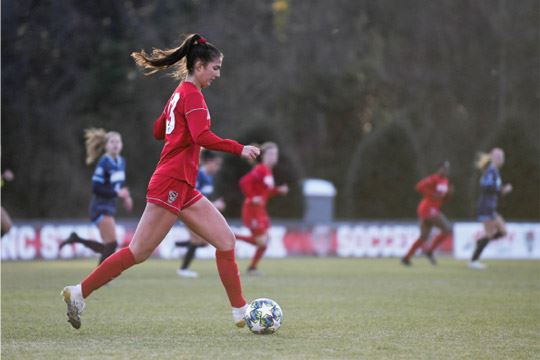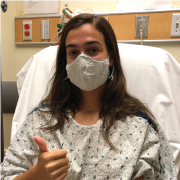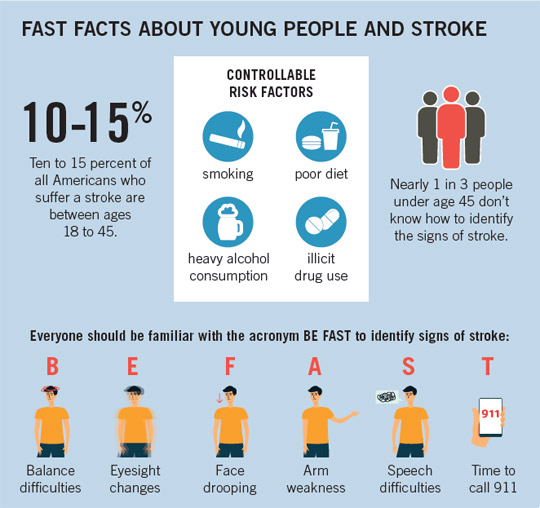At each step of her stroke recovery, Margot focused on returning to the sport she loved.

This past summer, Margot Ridgeway, 21, played soccer for a club team in Spain while her mom, Donna, and her family watched her matches on YouTube and cheered her on from their Fair Haven home. It was a stark contrast to 12 months earlier, when Margot wondered whether she’d ever play soccer again after suffering something unfathomable—a stroke.
“I don’t look like most stroke survivors,” says Margot, a Division I soccer player and philosophy of law major at North Carolina State University. “But everything I went through taught me how important it is for young people and women to be their own health advocate.”
A Stroke Misdiagnosed
 Margot’s journey began on her summer break in June 2020. She was swimming with friends on a Tuesday night when “someone pushed me down in the water,” she says. Margot didn’t think anything of it until that night when she suddenly began speaking gibberish. “I couldn’t find the right words,” she says. “Nothing was coming out right.”
Margot’s journey began on her summer break in June 2020. She was swimming with friends on a Tuesday night when “someone pushed me down in the water,” she says. Margot didn’t think anything of it until that night when she suddenly began speaking gibberish. “I couldn’t find the right words,” she says. “Nothing was coming out right.”
She went home to sleep it off, then woke up the next morning with what she thought might be a migraine and began vomiting. Her mom rushed her to a nearby hospital, where Margot was diagnosed with a concussion. She wasn’t sure about that. “I’d had two concussions before, and they never presented that way,” Margot says.
By Thursday morning, Margot began to feel numb on the right side of her body, and she and her mom knew something else was wrong. Her mom contacted Margot’s former soccer coach, who recommended that Margot meet with Jason Krystofiak, MD, Medical Director, The Matthew J. Morahan III Health Assessment Center for Athletes (Morahan Center); a sports medicine specialist with Cooperman Barnabas Medical Center (CBMC) and a member of RWJBarnabas Health Medical Group.
“Her right-side numbness, difficulty word-finding and significant headaches were multiple red flags that indicated something more serious than a concussion was happening,” recalls Dr. Krystofiak of Margot’s visit to his office at the Morahan Center. He ordered an MRI, which was stopped in midstream. “They said, ‘You have to get out right now. Your brain might be bleeding. We have to call 911,” Margot recalls.
Quick Response
An ambulance rushed Margot from Dr. Krystofiak’s office to the Emergency Department at CBMC. There, Margot was examined by a team from Neurosurgical Services for RWJBarnabas Health (RWJBH), an elite group that uses a multidisciplinary approach to treat a variety of conditions affecting the nervous system. After another MRI and an arteriogram, they had a diagnosis: Margot had suffered a parietal temporal ischemic stroke, a small stroke that affected the left side of her brain.
The team called in cardiologists and hematologists to try to figure out how a stroke could happen in a young athlete like Margot. A test called a bubble echocardiogram revealed that Margot had a patent foramen ovale (PFO), or hole in her heart, which she’d been born with. “I learned afterward that about one-quarter of the population has an open PFO,” says Margot’s mom, Donna.
PFO played a role in Margot’s stroke. “We believe an oral contraceptive she used created blood clots in her pelvis,” Dr. Krystofiak explains. “Then clot material broke off and traveled upward. If she didn’t have a PFO, the clot likely would’ve traveled to her lungs. But instead, the clot material went through her PFO and traveled to her brain, causing the stroke.”
Margot spent one week at CBMC. For six months, she needed injectable blood-thinning medication twice a day to reduce her risk for future strokes. She also had surgery in late October 2020 to close her PFO.
Back On The Field
At each step of her stroke recovery, Margot focused on returning to the sport she loved. “The doctors knew I played soccer, so they called me Mia Hamm [a famous U.S. women’s soccer player],” Margot says. “They assured me I’d be playing as soon as I could.”
Margot completed physical therapy and speech therapy in late 2020. In February 2021, she played a full 90 minutes in the North Carolina State women’s soccer team’s opening game. By season’s end, she earned Comeback Player of the Year honors. “I feel almost 100 percent back to the same player I was,” she says.
In addition, she’s become a champion for young people and stroke, raising nearly $11,500 for Tedy’s Team. It’s a nonprofit created for former pro football player Tedy Bruschi, who had a PFO and suffered a stroke at a young age (31). “I relate to his story,” Margot explains.
Margot says her journey has changed her perspective. “I used to get up at 6:30 a.m. and say I had to go to practice,” she says. “Now I say I get to go to practice and play soccer with my best friends like I’ve wanted to do since I was a little girl.”
Cooperman Barnabas Medical Center is home to a Comprehensive Stroke Center and Joint Commission-certified Advanced Primary Stroke Center. To learn more, call 973-322-6500.
